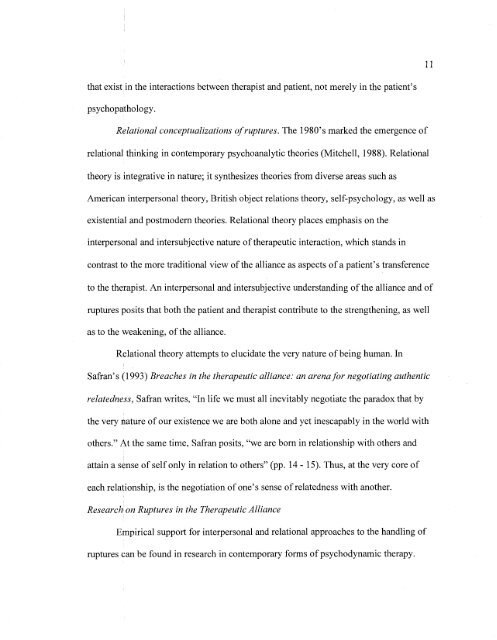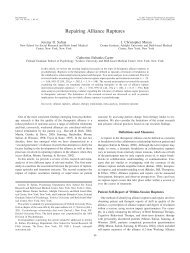Download - The Safran Lab
Download - The Safran Lab
Download - The Safran Lab
Create successful ePaper yourself
Turn your PDF publications into a flip-book with our unique Google optimized e-Paper software.
that exist in the interactions between therapist and patient, not merely in the patient's<br />
psychopathology.<br />
Relational conceptualizations of ruptures. <strong>The</strong> 1980's marked the emergence of<br />
relational thinking in contemporary psychoanalytic theories (Mitchell, 1988). Relational<br />
theory is integrative in nature; it synthesizes theories from diverse areas such as<br />
American interpersonal theory, British object relations theory, self-psychology, as well as<br />
existential and postmodern theories. Relational theory places emphasis on the<br />
interpersonal and intersubjective nature of therapeutic interaction, which stands in<br />
contrast to the more traditional view of the alliance as aspects of a patient's transference<br />
to the therapist. An interpersonal and intersubjective understanding of the alliance and of<br />
ruptures posits that both the patient and therapist contribute to the strengthening, as well<br />
as to the weakening, of the alliance.<br />
Relational theory attempts to elucidate the very nature of being human. In<br />
<strong>Safran</strong>'s (1993) Breaches in the therapeutic alliance: an arena for negotiating authentic<br />
relatedness, <strong>Safran</strong> writes, "In life we must all inevitably negotiate the paradox that by<br />
the very nature of our existence we are both alone and yet inescapably in the world with<br />
others." At the same time, <strong>Safran</strong> posits, "we are born in relationship with others and<br />
attain a sense of self only in relation to others" (pp. 14 - 15). Thus, at the very core of<br />
each relationship, is the negotiation of one's sense of relatedness with another.<br />
Research on Ruptures in the <strong>The</strong>rapeutic Alliance<br />
Empirical support for interpersonal and relational approaches to the handling of<br />
ruptures can be found in research in contemporary forms of psychodynamic therapy.<br />
11



